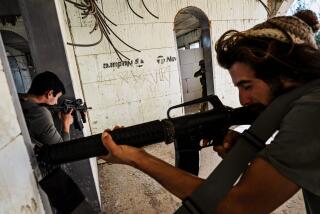Tulkarm Takes the Reins, and Hopes for a More Open Road
ANABTA, West Bank — Cars and tractor trailers roared freely along a stretch of country road here Tuesday, hours after Israeli troops opened a highway gate as part of an agreement to give Palestinian forces security responsibility in and around the town of Tulkarm.
Tile vendor Nihad Shalakhteh said that for the first time in four years, he was able to drive through the spot where the yellow steel gate swung open early Tuesday morning. In the past, Shalakhteh said, he had to leave his car on one side of the gate, walk around and get a taxi on the opposite side to continue on to Tulkarm, seven miles away.
Shalakhteh, 30, from the West Bank town of Nablus, said he hoped to see other Israeli checkpoints removed.
“We want them to apply the same thing in Nablus,” he said.
As Palestinian police took their positions in Tulkarm and nearly a dozen surrounding villages, residents voiced hope that the transfer of security responsibilities augured a broader relaxation of Israeli controls and would help revive the local economy.
“Nothing has changed yet,” said Abdulaziz Ismail, 45, who was selling strawberries in downtown Tulkarm. “Let’s see the impact of this decision on the movement in the streets, in the stores. We want to see economic improvements.”
Tulkarm is the second West Bank town in which Israel has yielded security control under agreements reached at last month’s summit in Egypt.
Kalkilya is expected to be handed over soon, followed by Ramallah and Bethlehem.
For Israel, the Tulkarm hand-over represents significantly more risk than the transfer last week of Jericho, a desert town that has remained mostly peaceful since the outbreak of violence in September 2000.
The Tulkarm area, by contrast, has been a hotbed of Palestinian militancy and a launching pad for a number of suicide bombings, including one outside a Tel Aviv nightclub last month that left five Israelis dead.
A massive bombing in March 2002 also was carried out by a militant from Tulkarm. It killed 30 people during a Passover gathering in the nearby Israeli town of Netanya and prompted an Israeli military offensive across the West Bank.
During the last 4 1/2 years, Israeli troops remained largely on Tulkarm’s outskirts but frequently raided the town in search of militants. The operations often resulted in shootouts.
On Monday, just hours before officials announced the final agreement on the hand-over, Israeli troops arrested four members of the militant group Islamic Jihad in Tulkarm and an adjacent refugee camp. Three area villages remain under Israeli control for now because of security concerns, Palestinian officials said.
Despite the opening of the highway gate, there were few signs of major change for Tulkarm residents. Two Israeli checkpoints leading to the town remained in place, and less than a mile down the road from the newly opened gate, Israeli soldiers flagged down cars to question drivers.
Israel says the roadblocks and highway checks help prevent suicide bombers and other would-be attackers from entering Israel. Ordinary Palestinians, however, view them as a curb on freedom of movement and a drain on the economy.
Loosened controls may mean thousands of Palestinians can return to jobs in Israel that they lost because of border closures. Palestinian officials want to make it easier for merchandise to arrive and for Tulkarm’s crops -- tomatoes, cucumbers, peppers and eggplant -- to be trucked out.
“We were in a big jail. Now after this deal, it makes it easier for the workers to work,” said Izzedine Sharif, governor of the Tulkarm area, which has a population of about 250,000.
Sharif voiced confidence that the 1,800 Palestinian police in his region would be able to maintain order, including preventing attacks by militants defiant of the agreement reached last week to observe a conditional cease-fire for the rest of the year.
“All of us -- we want this kind of peace,” Sharif said.
Some of the Palestinian police on patrol Tuesday carried weapons -- a practice barred by Israel when it held security control. Palestinian authorities installed a checkpoint of their own, marked by crisp new flags, not far from one of the remaining Israeli roadblocks.
Murad Abu Tammam, a traffic officer, said Tulkarm police had prepared intensively in recent weeks. Officers got fresh training and vacations were canceled, he said. Tammam, 29, said he believed that the newly empowered police could help curb common crimes, such as car theft.
Some Tulkarm residents sounded skeptical that the conciliatory spirit between Israel and the Palestinians would last.
Alongside the newly opened highway gate, 43-year-old vendor Naef Foukha watched cars speed past his makeshift shop -- a crude lean-to haphazardly covered with tarpaulin and corrugated panels.
Sales of his candy and pastries were good when traffic had to stop. With the barrier open, Foukha said, his trade might dry up. He wasn’t ready to shut down, though.
“Something could happen any minute,” Foukha said. “That gate could close. Why should I give it up immediately?”
More to Read
Sign up for Essential California
The most important California stories and recommendations in your inbox every morning.
You may occasionally receive promotional content from the Los Angeles Times.










